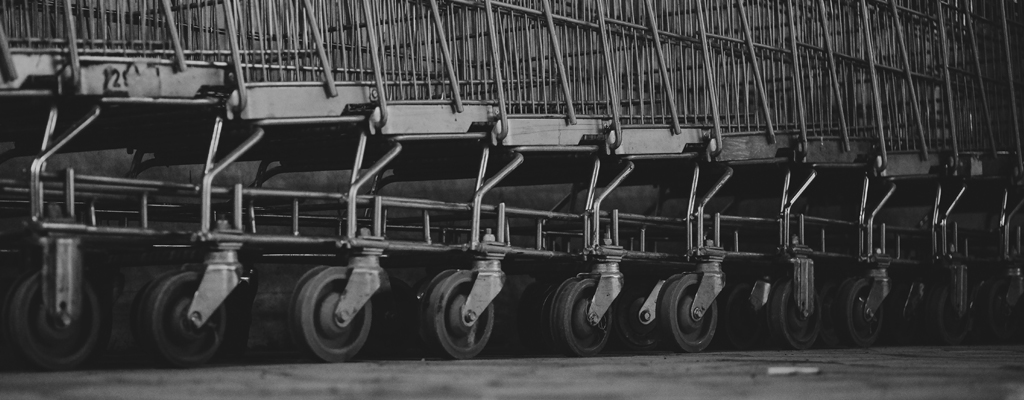Not far from the university campus, an elderly man walking his small dog turns into an underpass and finds a shopping trolley, alone in the tunnel. The sight of it, suddenly there, a skeletal shadow in the empty space, makes him jump. The underpass is a regular route for students returning to campus from the only nightclub in town. Their antics are surely responsible. His heart, like a spun coin, settles.
The dog strains on its lead as they approach the trolley. The man slackens his grip and the dog lurches forward. It sniffs about the wheels for a moment and then retreats, whimpering, tail between its legs. “Scared of your own shadow?” he says. The dog whines. The man shivers and zips up his coat. He pulls the dog away.
His walk culminates in a brief stretch through the open campus, parallel to a shallow river flowing between the student accommodation blocks. There is another trolley here, upturned, its wheels clogged with brown algae. Split-end reeds, laced through its iron ribcage, trail in the gentle current. This trolley does not surprise him, he has passed it many times. It is a thing of beauty, part of the landscape, where manmade has merged with the natural. Ducks rest and talk on it as they would a rock.
It is not unusual to see a trolley in a parking space by the main reception, reserving the spot for whomever placed it there. There are two by the outdoor gym, chained together with their own locks, back to back like hostages. In the morning fresh tracks can be seen in the dew-frosted grass, some students having played move-about in the dark.
In a strong wind they get around unchaperoned. Everything about them unbalanced and wonky. Their joints shriek. Their ankles twist backwards. A student with shopping bags circumvents one that’s rolled in protest onto the concourse. There is another by the fire exit of the lecture centre. This one has icicles on its handle bar and an empty cider can in its belly. “When did this get here?” say students loitering in the break. They put their cigarettes out on the supermarket logo, melting a small black crater in the plastic.
On the SU Facebook page, an official tally, for unofficial wagers, is kept of the competing brands. Trolleys from Lidl and Iceland and Morrisons and Tesco and the huge Sainsbury’s by the leisure centre on the other side of town. A lecturer is late to her own office hours because a gaggle of baskets with wheels from McColl’s corner shop is blocking the accessibility ramp and, due to inconclusive security footage, the culprit remains at large.
After Christmas break, a “state of infestation” is declared. There are more trolleys on the grounds today than could ever realistically be of use to the student body. Custodial positions are appointed to tackle the growing problem. Title bumps granted, salaries increased. Signs are put up alongside the others. No smoking. No alcohol. No trolleys.
Regardless, they congregate.
In the stairwells. In the lifts. There are open lectures on the law of attraction. Do we attract things because we want them or because they want us? Digi-Coms roll out a poster campaign appealing to the eco-conscious. The Humanities and Social Sciences argue that the STEM department is to blame. Hiding something like a massive magnet, for one of their experiments — “Well they have the funding for it!” — that must be drawing them all in.
To make use of a warmer-than-average spring night, two thrill seekers sneak into the rafters of the theatre building and find their way onto the roof. They are friends by circumstance, like most, assigned the same flat on a top floor. They knock coded messages on the wall that separates them. In reading week, one replaced the other’s desk chair with a shopping trolley, and a traffic cone just for luck. A printed picture on the bedroom door preserves a period they spent essay writing, cross legged in the trolley’s cradle.
There is currently a trolley from Aldi in their front drive. They have never shopped at Aldi. It is not the same trolley they used to transport their belongings from halls to the new house, whose arthritic wheels on the uneven pavement made their teeth chatter, their wrists ache. They parked that one outside the front door, between the wall and the bin box, where it was quickly taken over by orb-weaver spiders. In the moments they weren’t looking, it worked itself free and moved on.
When exams are over, on their walk back from the pub, these friends will hijack another found trolley and take turns pushing each other at fast speeds down a residential road. Hardworking, well-to-do residents will wake in their beds from the screaming and the laughter. They will draft letters of complaint, they will bicker with their spouses. And then the trolley wheels will jam or spin backwards, as they do, and its passenger will fly forwards in a flailing arc, hitting the wrong part of their head on the kerbside.
But tonight, atop the theatre building, they pretend their hands are binoculars.
“There,” says one, pointing. “And there, another one!”
Coming from all directions, these trolleys, too many to count, and always creeping, always inwards. The sight of them, glinting silver under the streetlamps, puts the taste of pennies in their mouths.
Vivienne Burgess‘s short fiction has been published online by LossLit and 365tomorrows, and in print by Cuckoo Young Writers, the Nottingham Review and Brunel University London Press. Her short story “Infliction” was shortlisted for the Show Me Yours Prize 2019 and will appear in the I’ll Show You Mine Symposium journal. She currently lives and works in the North East of England and can be found on twitter at @viennvienn.


Some very fine lines. I liked it a lot.
Thanks.